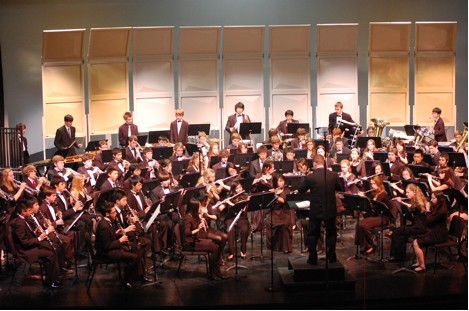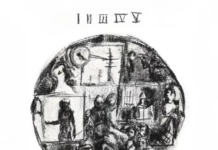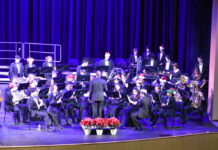This past weekend, 100 of the best private school musicians in the state of Texas convened in San Marcos for the annual TPSMEA All-State Band Clinic. The musicians rehearsed for three days, January 27-29 (Thursday through Saturday of last week), culminating in a concert at Texas State University’s Evans Auditorium on Saturday night.
The process of making the band began in August when students received their audition pieces. Each musician had to play two songs – a technical piece that displayed their range and speed, and a lyrical piece that showed off their dynamics and ability to play complex rhythms and time signatures. Each student practiced throughout the fall until mid-November, when they recorded their audition pieces and sent them off to the adjudicating committee, who judged them in early December. Students then found out whether or not they made the band a week or so later. In January, those students who did make the cut received the songs that the all-state band was going to be playing. Upon arriving at the clinic, every musician (except those in percussion) had to re-audition on those songs in order to determine their chair (rank) within their section. After the judges ranked each section, they assigned each musician the parts that they would be playing; the first-chair players got the harder parts and got to play the solos, whereas the last-chair players got the not-as-complicated parts. By no means does this suggest that the last-chair players are not as important; every member of a wind ensemble, symphony orchestra, jazz quartet, rock band, funk group, hip-hop trio, etc. knows that every part of the music needs to sound good for the whole group to sound good.
The band then rehearsed Thursday night, Friday morning and afternoon, and Saturday morning under the conducting of Dr. Rodney Schueller, the director of bands at Texas State University. The weekend’s climax was the concert Saturday night at Texas State’s Evans Auditorium. Putting together a whole concert in less than three days sounds like a ridiculous idea, but keep in mind that these musicians are the best that Texas’s private schools have to offer and they have a love for music. “You guys wouldn’t be here if you didn’t have passion,” said Dr. Schueller during one rehearsal. Dallas Jesuit was well represented on this all-star team of musical talent as almost every section had at least one Jesuit student in it; the clarinet and percussion sections even had four apiece. It’s not just the experienced juniors and seniors who made the band either. Three freshmen and five sophomores made the band, including Daniel Ahn ’14, who made second chair in the percussion section, and Christian Carson-Banister ’13, who made first chair tuba. The all-state band wasn’t the only musical group performing at the all-state clinic though – the all-state jazz band, choir, and orchestra were also there, with Dallas Jesuit represented in every one. One thing remained the same for all three groups: the high level of talent and dedication. “The all-state band differs from regular band in that excellence is the norm,” said Jesuit senior Peter Millhorn, drummer for the jazz band. “I am always impressed by the dedication in my all-state peers. During the week, it is inspiring to see everyone working so hard toward the same goal.” And that attitude, the attitude of everyone working towards the same goal, is really what makes the all-state ensembles special. During the jazz band’s performance Saturday night, director Stockton Helbing, who had mesmerized the crowd with a drum solo during the performance of his composition “Crazy Aquarius” (“It was truly inspiring to see him manipulate the drum set and lead the band,” Millhorn commented), told a story about how legendary saxophonists Sonny Rollins and John Coltrane decided to work together rather than compete against each other. If Rollins and Coltrane didn’t compete against each other, than we shouldn’t, Mr. Helbing reasoned. The all-state ensembles truly illustrate this idea that the good of the group is more important than personal glory.
The weekend’s finale, the Saturday night concert, was a huge hit with the crowd. The band opened up with Frank Ticheli’s “Sun Dance,” a piece that Jesuit junior percussionist Ben Cordell “enjoyed…because it’s a contemporary piece with an interesting melody line, a rhythm that grooves nicely and shifting time signatures that make it challenging.” “I thought it was the most catchy,” added freshman flutist Peter Park. “As the opening piece, I knew it caught the audience’s attention.” Next the band performed Gustav Holst’s epic “First Suite in Eb,” a song composed of three different movements: the opening “Chaconne” with its different variations on a single 8-bar phrase; the “Intermezzo” with its different time/key signatures and solos on various instruments; and finally, the fast-paced “March.” Third on the set list was another Frank Ticheli piece, the emotional “Rest” written for a young boy who had unfortunately lost his life in a drowning accident. The band closed with the galloping “Whip and Spur,” which featured the trumpets and trombones standing up while playing the last phrase of the song. It was an incredible ending to the amazing all-state weekend, which provided young musicians with the opportunity to make new friends and perform in an extremely talented ensemble. “All-state band is a completely different level of performance than Jesuit’s band,” Mr. Cordell remarked. “It has more concentrated talent and more motivation. In three days with about fourteen hours of rehearsal, the all-state band learned four pieces of music that would, for the most part, be quite challenging for the Jesuit band as a whole.”
(photo courtesy of Kathy McCabe)






